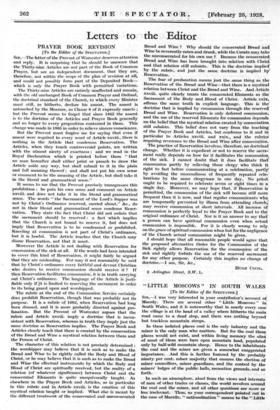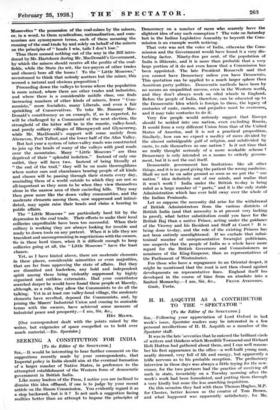" LITTLE MOSCOWS " IN SOUTH WALES [To the Editor
of the SPECTATOR.]
SIR,—I was very interested in your contributor's account of Maerdy. There are several other " Little MOHOOWS " in South Wales, and it is noteworthy that in nearly every case the village is at the head of a valley where hitherto the main road came to a dead stop, and there was nothing beyond but trackless mountain steeps.
In these isolated places coal is the only industry and the miner is the only man who matters. But for the coal these places would not exist, and within living memory the sited of most of them were bare open mountain land, populated only by half-wild mountain sheep. Hence to the inhabitants the coal and the miner are given a somewhat exaggerated importance. And this is further fostered by the probably ninety per cent. miner majority that ensures the election of miner councillors, miner guardians, and the control by the miners' lodges of the public halls, recreation grounds, and so forth.
In such an atmosphere, aloof from the views and interests of men of other trades or classes, the world revolves around the coal and the miner, and all other questions are more or less irrelevant. Thus, as your correspondent pointed out in the case of Maerdv. " nationalization " means to the " Little Muscovites " the possession of the coal-mines by the miners, or, in a word, to them syndicalism, nationalization, and com- munism are synonymous terms, each of them meaning the running of the coal trade by and solely on behalf of the miners on the principles of " heads I win, tails I don't lose."
Thus there seemed nothing out of the way in the Bill intro- duced by Mr. Hartshorn during Mr. MacDonald's Government, by which the miners should receive all the profits of the coal- fields, while the State (to wit, the tax-payers of other trades and classes) bore all the losses ! To the " Little Moscows," accustomed to think that nobody matters but the miner, this seemed a natural and obvious proposition !
Proceeding down the valleys to towns where the population is more mixed, where there are other trades and industries, and where there is a considerable middle class, one finds increasing numbers of other kinds of miners, fewer " Com- munists," more Socialists, many Liberals, and even a fair sprinkling of Conservatives. To take Mr. Ramsay Mac- Donald's constituency as an example, if, as is expected, he will be challenged by a Communist at the next election, the stronghold of the latter will be in the remote, valley-head, and purely colliery villages of Blaengwynfi and Glyncorrwg, while Mr. MacDonald's support will come mainly from Aberavon, Port Talbot, and the lower half of the Afan Valley.
But last year a system of inter-valley roads was constructed to join up the heads of many of the valleys with good roads over the mountains. Many " Little Moscows " are thus deprived of their " splendid isolation." Instead of only one outlet, they will have two. Instead of being literally at " the end of the trail," they will be on main thoroughfares where motor cars and charabancs bearing people of all kinds and classes will be passing through their streets every day, reminding them of a world outside to which they are not so all-important as they seem to be when they view themselves alone in the narrow area of their encircling hills. They may then grow more like the down valley communities, and the moderate elements among them, now suppressed and intimi- dated, may again raise their heads and claim a hearing in public affairs.
The " Little Moscows " are particularly hard hit by the depression in the coal trade. Their efforts to make their local collieries unprofitable have been too successful. When their colliery is working they are always looking for trouble and ready to down tools on any pretext. When it is idle they are truculent and uncompromising in negotiations with the owners.
*So in these hard times, when it is difficult enough to keep collieries going at all, the " Little Moscows " have the least chance.
Yet, as I have hinted above, there are moderate elements in these places, considerable minorities or even majorities, that are far from approving the state of affairs. But they are disunited and leaderless, any bold and independent spirit among them being violently suppressed by highly organized and ruthless extremists. Had your contributor searched deeper he would have found these people at Maerdy, although, as a rule, they allow the Communists to do all the talking. Yet in at least one valley-head village, the moderate elements have revolted, deposed the Communists, and, by joining the Miners' Industrial Union and coming to amicable terms with the owners, have achieved some measure of industrial peace and prosperity.—I am, Sir, &c., HiN Mums.
[Our correspondent dealt with the points raised by the writer, but exigencies of space compelled us to hold over much material.—En. Spectator.]









































 Previous page
Previous page